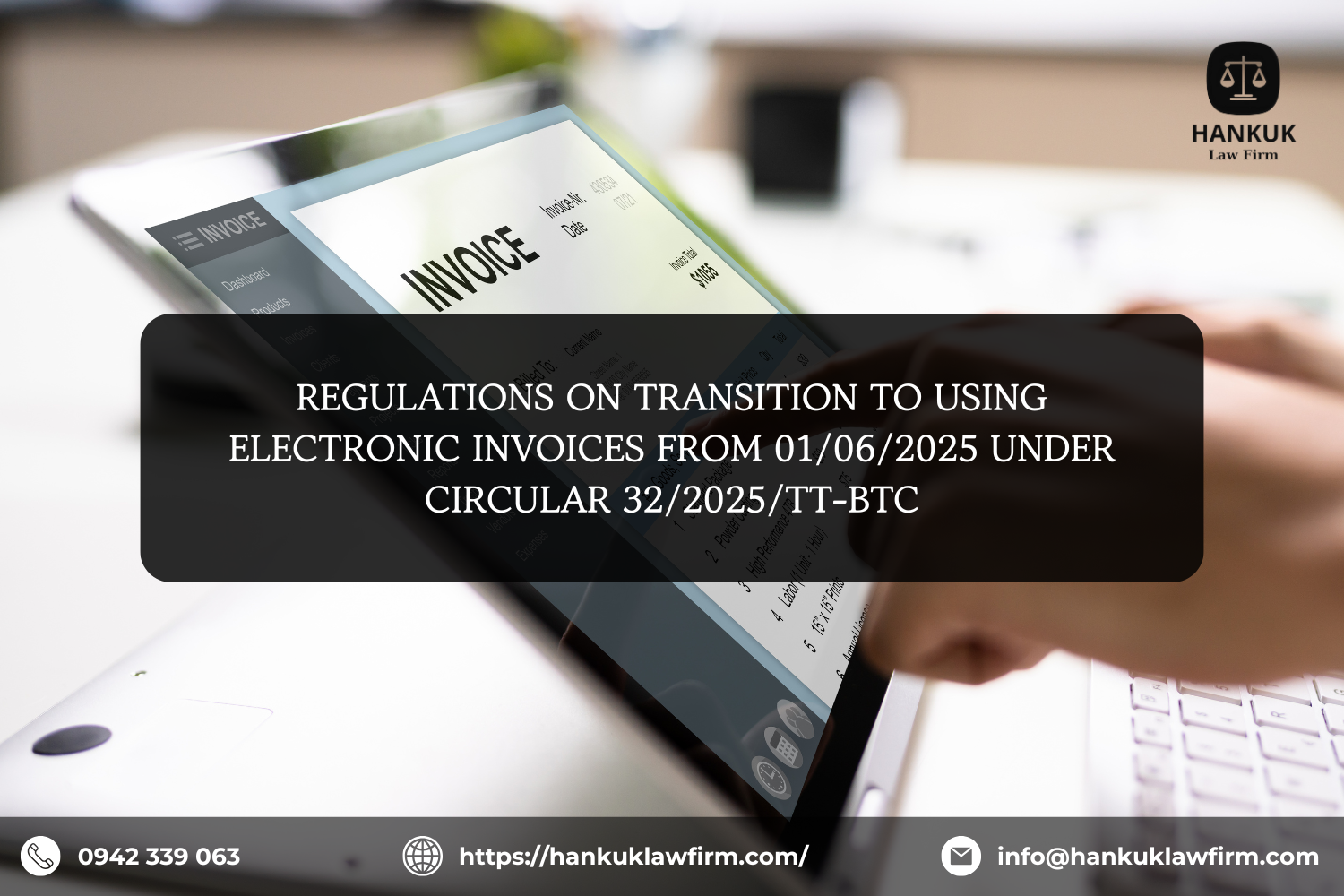REGULATIONS ON TRANSITION TO USING ELECTRONIC INVOICES FROM 01/06/2025 UNDER CIRCULAR 32/2025/TT-BTC
Contents
- I. Legal basic
- II. What is an Electronic Invoice?
- III. Guidance on the transition to using electronic invoices from June 1, 2025 under Circular 32/2025/TT-BTC
- 3.1. Registration/Change of E-Invoice Usage Information
- 3.2. Transition for using electronic invoices from cash registers for business with multiple business activities
- IV. Subjects of application of Circular 32/2025/TT-BTC guiding Decree 123/2020/ND-CP and Decree 70/2025/ND-CP on electronic invoices
- V. How to handle electronic invoices of tax authorities when there are errors?
- VI. Conclusion
- VII. About Us, Hankuk Law Firm
I. Legal basic
- Decree 70/2025/ND-CP
- Circular 32/2025/TT-BTC
- Decree 123/2020/ND-CP
- Circular 31/2021/TT-BTC
II. What is an Electronic Invoice?
An electronic invoice is a type of transactional document presented in the form of electronic data, which may or may not bear a code issued by the tax authority. It is created by an organization or individual during the process of selling goods or providing services via electronic devices, for the purpose of recording transactional information in accordance with tax and accounting laws. An electronic invoice also includes cases where it is generated from a cash register that is capable of connecting to and transmitting electronic data to the tax authority.
An electronic invoice with a tax authority’s code is an electronic invoice that has been authenticated and issued a code by the tax authority before the organization or individual selling goods or providing services sends it to the buyer. The tax authority’s code on the electronic invoice includes a transaction number, which is a unique sequence of numbers generated by the tax authority’s system, and a string of characters encoded by the tax authority based on the seller’s information recorded on the invoice.
An electronic invoice without a tax authority’s code is an electronic invoice issued by an organization selling goods or providing services and sent to the buyer without a code from the tax authority. After completing the procedure for registering electronic invoices with tax authority codes. The method of invoice issuance depends on whether the enterprise chooses to issue invoices directly via the General Department of Taxation’s e-portal or through an electronic invoice service provider.
Note on the case of suspension of using electronic invoices with a tax authority’s code: When issuing electronic invoices, enterprises must ensure the correct format, accurate registered information, and complete content of the electronic invoice. In addition, they must not fall under the cases of suspension of using electronic invoices with a tax authority’s code as stipulated in Clause 1, Article 16 of Decree No. 123/2020/NĐ-CP. Only then will the authentication code be granted.
III. Guidance on the transition to using electronic invoices from June 1, 2025 under Circular 32/2025/TT-BTC
According to Article 8 of Circular No. 32/2025/TT-BTC, guiding the implementation of Decree No. 70/2025/NĐ-CP (take effect from June 1, 2025), regulations on the transition to electronic invoices are as follows:
Taxpayers who are currently using electronic invoices without a tax authority’s code and wish to switch to electronic invoices with a tax authority’s code shall update their electronic invoice usage information in accordance with Article 15 of Decree No. 123/2020/NĐ-CP (as amended and supplemented by Clause 11, Article 1 of Decree No. 70/2025/NĐ-CP).
3.1. Registration/Change of E-Invoice Usage Information
Taxpayers who are eligible to use electronic invoices without a tax authority’s code under Clause 2, Article 91 of the Law on Tax Administration, but are identified as high tax risk according to Circular No. 31/2021/TT-BTC dated May 17, 2021 of the Ministry of Finance on the application of risk management in tax administration, and are notified by the tax authority (using Form No. 01/TB-KTT in Appendix IB issued together with Decree No. 70/2025/NĐ-CP) regarding the transition to the use of electronic invoices with a tax authority’s code, the taxpayer must switch to using electronic invoices with such a code. Within 10 working days from the date of the tax authority notification, the taxpayer must update their electronic invoice usage information (switching from using electronic invoices without a tax authority’s code to invoices with such a code). After 12 months of using electronic invoices with a tax authority’s code, if the taxpayer wishes to switch to using electronic invoices without a code, they must update their electronic invoice usage information in accordance with Article 15 of Decree No. 123/2020/ND-CP (as amended and supplemented by Clause 11, Article 1 of Decree No. 70/2025/ND-CP). Based on Clause 2, Article 91 of the Law on Tax Administration and Circular No. 31/2021/TT-BTC of the Ministry of Finance, the tax authority shall review and decide whether to approve or reject the request.
3.2. Transition for using electronic invoices from cash registers for business with multiple business activities
If an enterprise engages in multiple business activities, it must register to use electronic invoices generated from cash register for its activities involving direct sales of goods and services to consumers (such as in shopping centers, supermarkets, retail sales excluding automobiles, motorcycles, and other motor vehicles; restaurants; hotels; passenger transportation services; services directly supporting road transportation; performing arts; entertainment and recreation activities; cinema operations; and other personal services in accordance with the Vietnamese Standard Industrial Classification). The enterprise shall register to use either electronic invoices with a tax authority’s code or electronic invoices without a code for its other business activities.

IV. Subjects of application of Circular 32/2025/TT-BTC guiding Decree 123/2020/ND-CP and Decree 70/2025/ND-CP on electronic invoices
Pursuant to Article 2 of Circular 32/2025/TT-BTC, the subjects of application include organizations, individuals as stipulated in Article 2 of Decree No. 123/2020/ND-CP and Clause 1, Article 1 of Decree No. 70/2025/ND-CP, which provides specific regulations:
– Organizations and individuals selling goods and providing services, including:
- Enterprises established and operating in accordance with Vietnamese law; branches and representative offices of foreign enterprises operating in Vietnam;
- Cooperatives and unions of cooperatives;
- Household businesses, individual business households, and partnerships;
- Public service units engaged in the sale of goods or provision of services;
- Organizations that are not enterprises but conduct business activities.
- Overseas suppliers without a permanent establishment in Vietnam that conduct e-commerce, digital-based business, and other services may voluntarily register to use electronic invoices in accordance with the provisions of Decree No. 123/2020/NĐ-CP.
– Organizations and individuals purchasing goods and services.
– Organizations collecting taxes, fees, and charges.
– Taxpayers, fee and charge payers.
– Organizations responsible for withholding personal income tax.
– Organizations engaged in invoice and document printing; organizations providing self-printed document software; organizations providing electronic invoice and document services.
-Tax authorities, including the General Department of Taxation, Department of Taxation, and Sub-department of Taxation (including regional Sub-departments).
– Customs authorities, including the General Department of Customs, Departments of Customs, Post-Clearance Audit Departments, and Customs Sub-departments.
– Other organizations and individuals related to the management and use of invoices and documents.
Pursuant to Clause 2, Article 19 of Decree No. 123/2020/ND-CP, in cases where an electronic invoice without a tax authority’s code has already been sent to the buyer and either the buyer or the seller later detects any errors, the following handling measures shall apply:
In case of errors related to the buyer’s name or address on an electronic invoice without errors in the tax identification number (TIN) and all other information is accurate, the seller is only required to notify the buyer of the error. It is not necessary to issue a new invoice. The seller shall notify the tax authority of the erroneous e-invoice using Form No. 04/SS-HĐĐT provided in Appendix IA enclosed with Decree No. 123/2020/NĐ-CP, except in cases where the erroneous e-invoice without the tax authority’s code has not yet been transmitted to the tax authority’s database.
In cases where there are errors related to: the taxpayer identification number (TIN); wrong amount on invoice, wrong tax rate, the tax amount or the goods specified in the invoice not conforming to the correct specifications or quality standards, the following handling options may be applied:
- The seller shall issue an electronic invoice to adjust the erroneous invoice. In case the seller and the buyer agree to prepare a written agreement prior to issuing an adjusted invoice for the erroneous invoice, the seller and the buyer shall prepare a written agreement specifying the errors, and then the seller shall issue an electronic invoice to adjust the previously issued erroneous invoice. The electronic invoice issued to adjust the previously issued erroneous electronic invoice must include the phrase: “Adjustment for invoice Form No.…, symbol…, No.…, dated… month… year…”.
- The seller shall issue a new electronic invoice to replace the erroneous one, except in cases where the seller and the buyer have agreed to prepare a written agreement before issuing the replacement invoice. In such cases, the seller and the buyer shall prepare a written agreement clearly stating the errors, after which the seller shall issue a new electronic invoice to replace the previously issued erroneous one. The new electronic invoice replacing the previously issued one must include the phrase: “Replacement for invoice Form No.…, symbol…, No.…, dated… month… year…”.
The seller shall digitally sign the new electronic invoice used to adjust or replace the previously issued erroneous invoice, and then send it to the buyer (in the case of using electronic invoices without the tax authority’s code) or send it to the tax authority for the issuance of a code for the new electronic invoice before sending it to the buyer (in the case of using electronic invoices with the tax authority’s code).
VI. Conclusion
From June 1, 2025, the transition and implementation of electronic invoices must strictly comply with Circular No. 32/2025/TT-BTC and the provisions of Decree No. 70/2025/ND-CP. Enterprises, organizations, and individual business households are required to proactively review the types of invoices currently in use and carry out registration or updates of electronic invoice information in accordance with the new requirements of the tax authority. At the same time, it is essential to strictly follow the prescribed procedures for handling errors on electronic invoices in order to avoid violations of invoice management regulations.
VII. About Us, Hankuk Law Firm

■ Hankuk Law Firm – Introduction
The goal of the legal services provided by HANKUK LAW FIRM is to support businesses, investors, and people. Our organization employs skilled Korean lawyers, partners, and professionals to provide legal services to businesses related to corporations and litigation.
To support the startup process, our lawyers and staff provide a wide range of services, including business law consulting, tax and immigration law consulting, real estate services, business consulting, marketing and communications, human resources, product distribution, franchise options, etc. We provide expert advice on every aspect of your business needs.
To protect the legitimate rights and interests of our clients and achieve the best results, we provide legal advice and participate in civil lawsuits related to business, labor, marriage, family, and inheritance.
■ Contact us now

For reliable and effective legal advice, please contact HANKUK LAW FIRM now. We are committed to providing you with the best possible answers and our team of experienced lawyers has extensive knowledge in many legal fields. We are always here to provide the most competent and dedicated support, whether you are dealing with contractual issues, commercial disputes or need guidance on foreign investment. HANKUK LAW FIRM is honored to have assisted hundreds of domestic and international clients in skillfully resolving complex legal issues as their trusted legal partner. Do not let legal issues hinder your success. Let us accompany you towards legal achievement and comfort. For prompt guidance and support to ensure your rights are always maintained at the highest standards, contact HANKUK LAW FIRM now.
■ Contact Hankuk Law Firm:
| Website: http://hankuklawfirm.com/en/
FB: https://www.facebook.com/hankuk.lawfirm Tiktok: https://www.tiktok.com/@hankuklawfirm Youtube: https://www.youtube.com/@hankuklawfirm6375 Email: info@hankuklawfirm.com SĐT: 0942.339.063 |
 |

